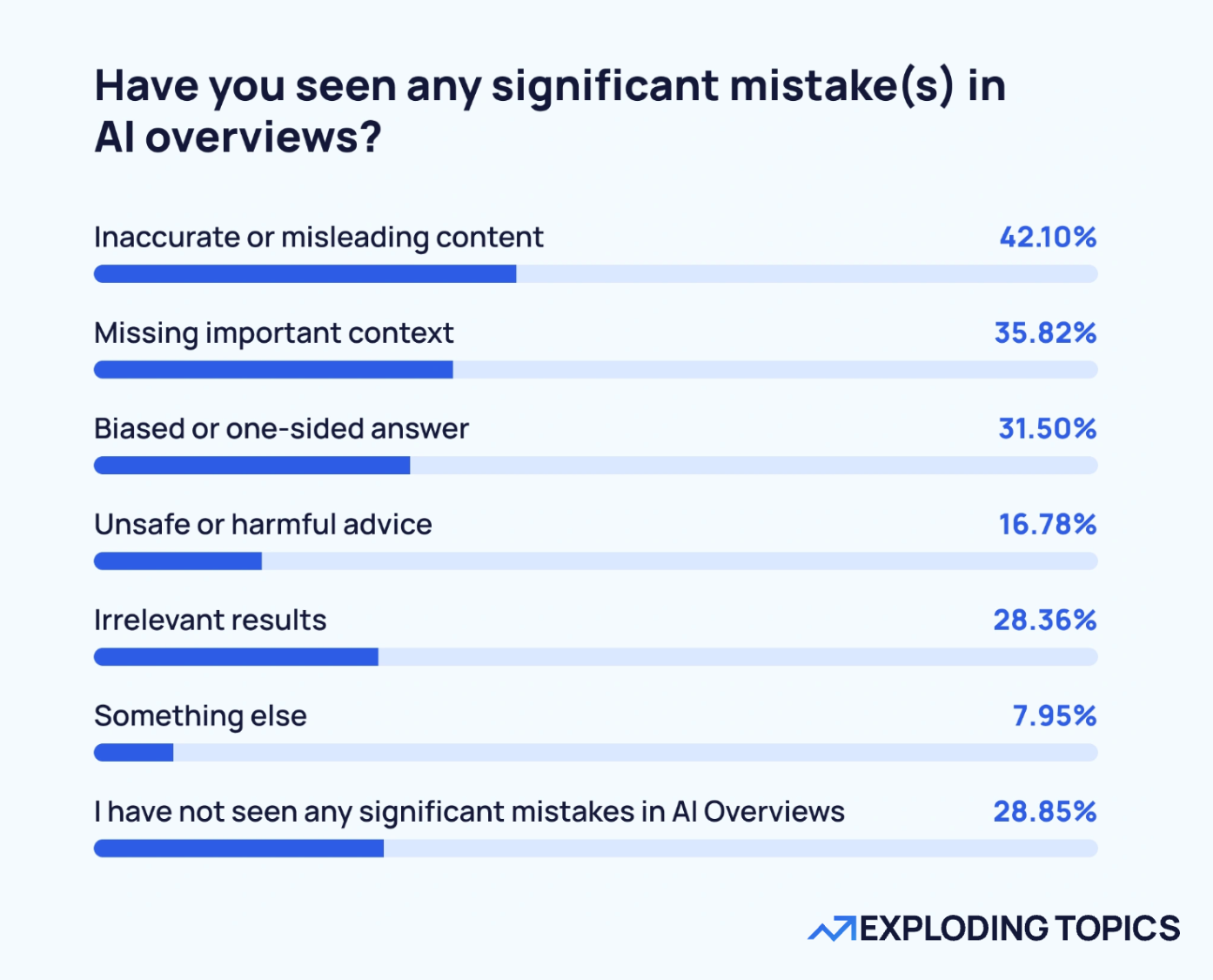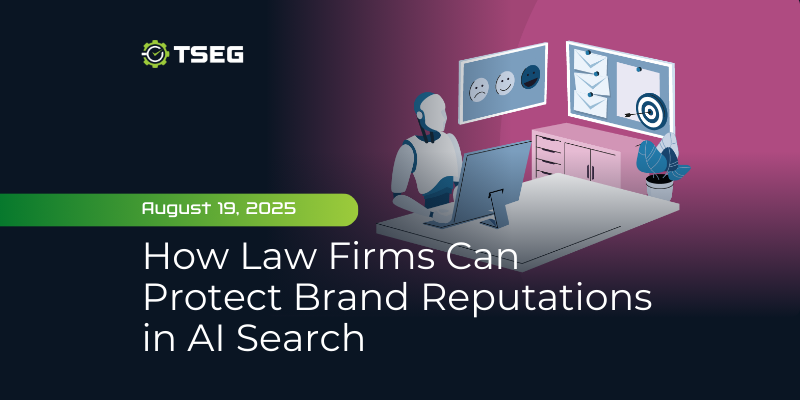How Law Firms Can Protect Brand Reputations in AI Search
Posted on Tuesday, August 19th, 2025 at 6:54 pm
The Reputation You Didn’t Approve
AI tools are already influencing how potential clients view your law firm. When someone searches for legal help, they often get a short answer at the top of the page that summarizes what the internet says about you. These responses are built from whatever data is available, whether or not it is correct.
That means your firm can be introduced with an outdated name, an old domain, or a former partner who left years ago. The summaries are not reviewed by editors or fact-checked by professionals. They rely on whatever was last published and still floating around the web.
This is especially common after a rebrand. Law firms often spend months planning a new name, a new site, and updated messaging. But unless the internet reflects those changes across every listing and mention, AI search tools may still display a version of your firm that no longer exists.
Once that information is shown to a user, it is rarely questioned. Most people will not click through to verify. They will assume the summary is accurate and move on. That creates a reputation problem without a clear path to fix it.
What appears in these summaries can influence decisions about who to call, who to trust, and which firm to avoid. If the story AI tells about your firm is wrong, then your next case may be going to someone else.
When AI Gets It Wrong
AI systems collect information from public sources and summarize it without confirming whether the details are current. They are not trained to understand the difference between a former name and a rebranded firm. If an outdated page is still live or a directory listing has not been updated, it can be pulled in and presented as fact. This can cause problems for law firms with common surnames, past partner transitions, or new branding efforts.
A recent survey showed that more than forty percent of people have seen incorrect or misleading answers from AI-generated summaries. Most of them do not take time to visit the original source. They stop at the answer they were given.

This becomes more damaging when your competitors are better positioned. If another firm has kept their messaging consistent and their listings updated, they are more likely to be shown with correct and positive information. Your brand, meanwhile, may be represented by whatever was last posted by a third party.
There are also cases where a verdict or settlement is mistakenly attributed to the wrong firm. This kind of mix-up can happen when AI pulls case summaries from secondary news sites or court databases that are not fully accurate. Over time, these errors begin to affect how people understand your work and your track record.
Each time a client sees your firm name linked to an outdated URL, mismatched partners, or incorrect practice areas, it chips away at the reputation you’ve built. If the wrong story is told often enough, it becomes the only one that gets repeated.
Building Signals That AI Will Respect
The information that AI tools surface about your law firm depends on how strong and consistent your presence is across the web. If your firm’s name, attorney bios, or practice focus appears differently across multiple platforms, AI systems are more likely to present the wrong version.
Start by reviewing every place your firm is mentioned. This includes legal directories, business profiles, press releases, social media, and attorney ranking sites. Make sure names, titles, contact information, and descriptions match your current branding. Even small differences in punctuation or formatting can lead to mixed results.
Old content needs to be reviewed and either updated or removed. If your firm changed domains after a merger or rebrand, make sure there are no broken links or references to the previous name still appearing in top search results. These are often the same sources that feed AI models.
Directory listings matter more than most firms realize. Make sure your profiles on Google Business, Avvo, Justia, and LinkedIn are up to date. These pages are frequently indexed, and when information is missing or inconsistent, AI summaries fill in the blanks using whatever else they can find.
In addition to cleaning up your existing footprint, you should also aim to appear in places that models treat as trusted sources. These include online forums, Q&A platforms, and reputable news sites. A mention in a discussion thread where legal services are being debated can sometimes carry more weight than a paid ad.
Creating Content That AI Will Actually Surface
If your website content is unclear, outdated, or scattered across long paragraphs, AI systems are more likely to skip over it or summarize it incorrectly. These AI tools are built to find clear information that matches specific questions. What gets shown in search often depends on how well your site explains what you do. The following are basic optimizations that most firms are implementing already, but nonetheless crucial to today’s AI search environment.
Every practice area should have its own page with dedicated content relevant to a multitude of search queries on traditional and AI search engines. Use a short title, a simple overview, and direct answers to the types of questions people usually ask throughout your client journey. Break your content into short sections. Use plain headings that reflect the services you provide.

Include unique, natural language answers to common legal questions (FAQs). These help AI tools understand the types of problems your firm solves. If you handle personal injury, write clearly about medical costs, insurance delays, or liability issues. If you focus on criminal defense, explain the court process in simple terms.
Attorney bios are often used as source material, but many are either too vague or too general. Make sure each profile lists the attorney’s focus areas, where they practice, and any recognitions or leadership roles they hold in the legal community. Avoid making the content sound like a sales pitch.
If your firm has handled complex cases or worked across multiple jurisdictions, state that clearly. Use real facts, not slogans. Describe the types of cases your team handles, how you work with clients, and what someone can expect after reaching out.
Focus on writing with clarity. Content should answer real questions using simple language and specific examples, not broad claims or filler language.
Guarding Your Firm’s Narrative
We recently put together a list of the top tools to monitor how your firm is being represented online. Begin by tracking your name, attorney names, and any prior branding or domains. Look at how your firm appears in summaries, legal directories, and forums. Even if a source seems minor, it may be influencing what AI tools surface in search.
Online reviews also shape these outcomes. When feedback is vague, hostile, or written under the wrong attorney profile, it creates noise that can distort your presence. Respond to reviews with facts and professionalism. If a review includes inaccurate claims, address them directly and clarify the situation without making it personal.
Set aside time to audit the sites that AI tools pull from most often. This includes your own website, attorney profiles, and media mentions. Remove broken links and update older pages. If a directory still lists a partner who left years ago, reach out and request corrections. These small steps can help prevent larger problems.
Firms that have experienced a rebrand or merger should prepare a clear explanation of the transition. AI systems may still link to older materials, so giving context helps maintain trust. Make sure your current brand is dominant across your online presence.
None of this happens automatically. If you want AI systems to reflect your firm accurately, someone on your team needs to take ownership of the details.
The Firms Getting Cited Are the Ones Getting Cases
AI search tools are already influencing which law firms get visibility and which ones get ignored. These systems are pulling whatever is best structured to find and summarize. If your firm’s information is outdated, inconsistent, or missing from trusted sources, someone else is being chosen instead.
This is why law firms need a strategy that includes more than just traditional SEO. What matters now is how clearly your content answers legal questions, how often your firm is mentioned in trusted places, and how well your brand stays aligned across every public listing.
TSEG works with law firms to address all of this. We help create content that AI tools can understand and use. We update outdated listings, build strong brand signals, and monitor how your firm is being represented across platforms. Our goal is simple: keep your firm visible, accurate, and competitive in search.
If your firm has recently rebranded, launched a new site, or added new attorneys, now is the time to take control of how you’re being seen. AI is already deciding who shows up. Make sure it’s you. Reach out to TSEG for more info on how we can help your law firm.
